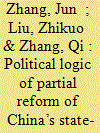| Srl | Item |
| 1 |
ID:
153391


|
|
|
|
|
| Summary/Abstract |
Immediately after Xi Jinping assumed the position of party secretary general, he launched a large-scale top-down antiwaste campaign amongst the Chinese cadre corps. Compared with similar policies announced by Xi’s predecessors, this campaign has distinct features that entail substantial political risk for the party secretary general. Why did Xi choose this politically risky strategy? Drawing on recent literature on authoritarian regimes, this article argues that, amongst all possible objectives, an authoritarian leader such as Xi can use this type of policy campaign to demonstrate his power. In particular, the inherent importance of informal politics, the recent developments in Chinese politics, and Xi’s personal background have increased his incentive and capacity to signal power by implementing such a campaign. A comparison with Xi’s two predecessors, interviews, and statistical analyses support this argument. The theoretical framework of this article also sheds light on the literature on the power sharing of authoritarian political elites.
|
|
|
|
|
|
|
|
|
|
|
|
|
|
|
|
| 2 |
ID:
152980


|
|
|
|
|
| Summary/Abstract |
By exploring the composition of the Chinese Communisty Party’s Central Committee since the 1990s, we analyze why state-owned enterprises reform has fallen into a partial reform equilibrium. We argue that two hypotheses, the interest group hypothesis and the adaptive power-sharing hypothesis, should be combined to fully comprehend the partial reform equilibrium symptom.
|
|
|
|
|
|
|
|
|
|
|
|
|
|
|
|